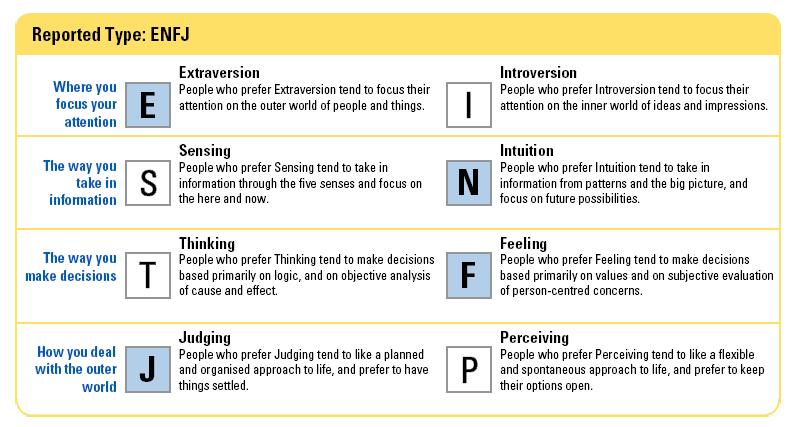
My personality type is apparently well suited for careers including journalism, public relations and marketing — which is a huge relief, considering those are the only ways I’ve supported myself since college.
I’ve taken the Myers Briggs personality test — which they are emphatic is not a test, but a personality type indicator — several times, most recently as part of my department at work. We all did the test type indicator then discussed what our similarities and differences mean for working together.
I find my consistency pretty interesting. In spite of getting older and, I’d like to think, evolving some into the person I’d like to be, my Myers Briggs type remains the same. Then again, when I read my elementary school report cards a few years ago, they pretty much sounded like my adult job evaluations: enthusiastic, idealistic, easily distracted.
Myers Briggs measures your preferences on four measures, then based on those results, places you into one of 16 possible combinations.
For example, I am more into using intuition than my senses to make decisions and more of a feeler than a thinker. Those two combined mean I’m an idealist.
That might be surprising if you looked at my resume and saw an MBA and a market research position. Yes, I love making a spreadsheet sing but I’m more interested in communicating the story in the numbers than simply looking at rows of data.
In a department workshop, our facilitator said two totally opposite people could approach the same career with different views — one might love HR because of its structure and policy, another might enjoy the ambiguity of interpreting individual needs and situations. So I don’t feel quite so odd being a sensing feeler who spends my days around numbers.
Still, it’s helpful to understand how your personality could lead you to see the world differently than others. John is an introvert, for example, so when he’s solving a problem, he’s more likely to want to retreat to consider it independently, and if he’s been in a social situation, he might need some alone time to recharge. I’m extroverted, so I like to talk through challenges, and I need to recharge by being with people if I’ve been isolated for too long.
The one place where I think I’m changing is on the P-J scale. If you’re a perceiver, you like to keep your options open and remain flexible. If you’re a judger, you prefer to have plans and order and structure. I’ve always been right on the fence on this scale, tipping slightly to P. Now I fall slightly on the J side, but I think that’s to compensate for years of making myself crazy with procrastination. I’ve retrained myself to make lists, to prioritize, to always hang my keys in the same place, because of years of wasted panic and last-minute rushing.
Years ago all of us at Argus Associates took Myers Briggs together and spent an afternoon talking about how to work with people of different types. We all got a copy of a book, Type Talk at Work, that I continue to refer to frequently.
It’s a good reminder that not everyone sees the world the same way I do.
Have you done Myers Briggs? Did anything surprise you? Was it helpful for you at work, at home, in choosing a career?
—–
Did you like this post?
Share it on Facebook / Twitter / Digg / StumbleUpon / Reddit / Fark / Del.icio.us

Playing to your strengths

2 Comments
margaret y.
The introvert/extrovert thing is huge. It’s how I understand myself and my world. I am an “innie” and I almost immediately peg people as innies or outies so I know how best to get along with them.
For example, if an innie is feeling down, she needs more alone time. If an outie is feeling down, bring her to a party.
Leave a reply